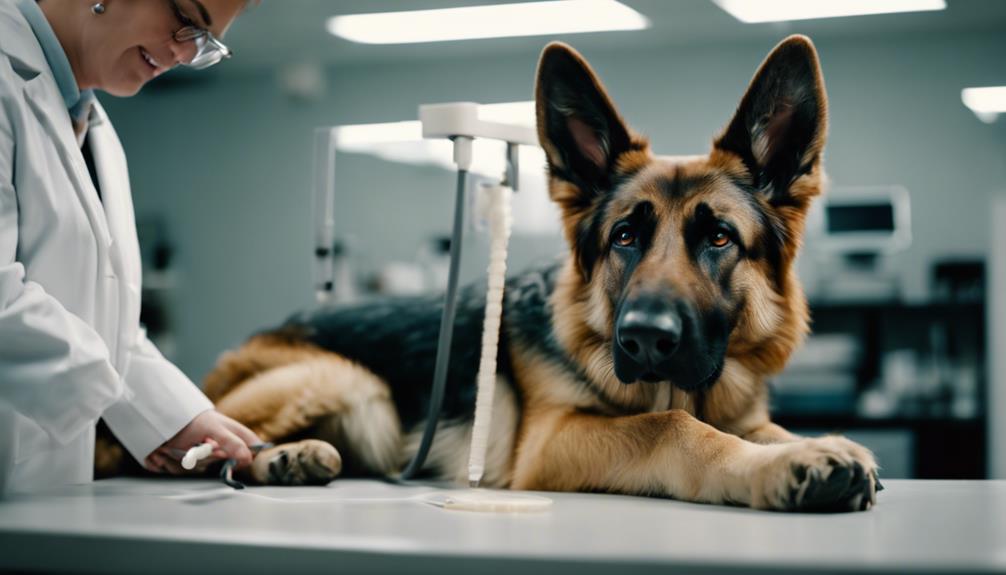🐾 Paw-some Partnership Alert! 🐾
As a pack of German Shepherd enthusiasts at MixGermanShepherd.com, we're always sniffing out the best products for our furry friends. Guess what? When you fetch something from Amazon through our links, we earn a little treat! 🦴
If you’ve ever noticed your German Shepherd mix experiencing unexplained tremors or difficulties with coordination, you might be concerned about potential neurological disorders. These conditions can vary in severity and impact on your canine companion’s well-being, requiring careful attention and management. Understanding the signs and causes of neurological issues in German Shepherd mixes is crucial not only for early intervention but also in providing the best possible care for your beloved pet. By exploring the complexities of these disorders, you can equip yourself with the knowledge needed to navigate this challenging terrain and ensure the best outcomes for your furry friend.
Key Takeaways
- Genetic predispositions impact neurological health in German Shepherd mixes.
- Common disorders include seizures, degenerative myelopathy, and epilepsy.
- Diagnosis and treatment involve genetic testing, neurologist consultation, and tailored management.
- Supportive care includes mobility aids, incontinence management, and emotional well-being prioritization.
Understanding Neurological Disorders in German Shepherd Mixes

When analyzing neurological disorders in German Shepherd mixes, genetic predispositions inherited from the German Shepherd parent play a crucial role in understanding and managing these conditions effectively. Certain neurological disorders, like Degenerative Myelopathy, can be passed down to German Shepherd mixes, emphasizing the importance of genetic testing to identify potential risks early on. By gaining insights into the genetic makeup of a specific mix, veterinarians and pet owners can proactively monitor and address any neurological issues that may arise.
Crossbreeding, while sometimes diluting the prevalence of certain neurological disorders, does not guarantee immunity. Therefore, regular veterinary check-ups coupled with genetic testing remain essential for early detection and intervention. Understanding the genetic predispositions unique to each German Shepherd mix can significantly impact the well-being and quality of life of these dogs. Through proper care, environment, and monitoring, potential neurological concerns can be effectively managed, promoting a healthier and happier life for your furry friend.
Common Neurological Disorders in German Shepherd Mixes

Common neurological disorders in German Shepherd mixes include seizures, degenerative myelopathy, and epilepsy. Seizures in German Shepherds can be inherited and may manifest in mixed-breed dogs, while degenerative myelopathy affects mobility due to spinal cord degeneration. Epilepsy, a common affliction, can also impact German Shepherd mixes, underlining the importance of proactive veterinary care and genetic testing.
Seizures in German Shepherds
Seizures, a prevalent neurological disorder in German Shepherd mixes like the German Shepherd/Australian Shepherd and German Shepherd/Labrador Retriever crosses, can manifest as sudden, uncontrollable convulsions or muscle spasms.
- Seizures in German Shepherd mixes can have various causes such as epilepsy, toxic exposure, or underlying health issues.
- Observing and identifying triggers can aid in managing and reducing the frequency of seizures.
- Treatment often involves a combination of medications, lifestyle adjustments, and consistent monitoring.
- Regular veterinary consultations are crucial for accurate diagnosis and tailored treatment plans.
- Owners play a vital role in providing a safe environment and following the veterinarian’s guidance to ensure the well-being of their German Shepherd mix.
Degenerative Myelopathy Overview
German Shepherd mixes, particularly those with genetic predispositions, may face the challenging effects of Degenerative Myelopathy, a progressive neurological disorder impacting mobility and hindlimb function. This disorder is characterized by nerve degeneration in the spinal cord, leading to hindlimb weakness, paralysis, and eventual loss of mobility. Genetic testing plays a crucial role in identifying dogs at risk of carrying the mutated gene responsible for Degenerative Myelopathy in German Shepherd mixes. While this disease typically affects older dogs, with symptoms appearing between 7 and 14 years of age, early diagnosis and effective management strategies can significantly improve the quality of life for affected dogs. Treatment options focus on supportive care to maintain comfort and mobility, enhancing the overall well-being of German Shepherd mixes living with Degenerative Myelopathy.
Epilepsy in GS Mixes
Epilepsy presents a significant challenge for German Shepherd mixes due to its recurring nature and potential triggers. When addressing epilepsy in GS mixes, it is essential to consider the following:
- Seizure Variability: Seizures can manifest differently in each dog, varying in frequency and intensity.
- Genetic Influence: Genetic predisposition plays a significant role in the development of epilepsy in GS mixes.
- Medication Compliance: Strict adherence to anti-seizure medications is crucial for managing and controlling seizures effectively.
- Lifestyle Adjustments: Creating a safe environment and reducing stress levels can help minimize seizure triggers.
- Veterinary Guidance: Regular consultations with a veterinarian specializing in neurology are essential for monitoring progress and adjusting treatment plans.
Understanding these aspects can significantly improve the well-being and quality of life for German Shepherd mixes with epilepsy.
Symptoms of Neurological Disorders in German Shepherd Mixes

When observing a German Shepherd mix for potential neurological disorders, be attentive to signs such as hind limb weakness, muscle atrophy, and loss of coordination. These mixed breeds may show symptoms like dragging of the hind limbs, difficulty standing or walking, and knuckling over, which could indicate underlying neurological issues. Additionally, watch out for behavioral changes such as reluctance to exercise, alterations in gait, and loss of bladder or bowel control, as these could be red flags for neurological disorders in German Shepherd mixes. Tremors, seizures, and changes in proprioception, affecting the awareness of limb placement, are also signs to monitor in affected dogs. If you notice any abnormal neurological signs in your German Shepherd mix, it is crucial to seek prompt veterinary evaluation. This evaluation will help determine the root cause of the symptoms and enable the initiation of appropriate treatment to ensure the well-being of your furry companion.
Diagnosing Neurological Disorders in German Shepherd Mixes

When diagnosing neurological disorders in German Shepherd mixes, it is essential to consider a range of diagnostic tests, symptoms, and potential treatment options. Diagnostic tests such as MRI, CT scans, and spinal taps play a crucial role in identifying the specific neurological condition affecting a German Shepherd mix. Understanding the symptoms and signs of neurological issues in these dogs is key to early detection and implementing appropriate treatment strategies.
Diagnostic Tests for GSD Mixes
Genetic testing is frequently employed in diagnosing neurological disorders in German Shepherd mixes to identify specific mutations associated with conditions like degenerative myelopathy. When investigating potential neurological issues in your German Shepherd mix, diagnostic tests play a crucial role in pinpointing the underlying causes. Here are some essential tests that may be utilized:
- Neurological exams: These assessments can reveal abnormalities in reflexes and coordination.
- Imaging tests: MRI or CT scans help visualize the brain and spinal cord, aiding in detecting structural abnormalities.
- Blood tests: Checking for infections, inflammation, or metabolic disorders that could contribute to neurological symptoms.
- Multidisciplinary approach: Involving veterinarians, neurologists, and specialists for accurate diagnosis and treatment planning.
- Collaborative effort: Working together to ensure comprehensive care for your German Shepherd mix.
Symptoms and Signs
In diagnosing neurological disorders in German Shepherd mixes, a crucial step is recognizing the symptoms and signs that may indicate underlying issues affecting your pet’s neurological health. Common signs of neurological disorders in German Shepherd dogs include hindlimb weakness, coordination problems, muscle atrophy, behavioral changes, seizures, and incontinence. It’s essential to consider genetic predispositions to conditions like epilepsy or degenerative myelopathy when observing these symptoms. Early detection through neurological exams and imaging tests such as MRI or CT scans is vital for accurate diagnosis and effective management. Below is a table summarizing key symptoms and signs to watch for in German Shepherd mixes:
| Symptoms | Signs |
|---|---|
| Hindlimb weakness | Coordination issues |
| Muscle atrophy | Behavioral changes |
| Seizures | Incontinence |
| Genetic predispositions | Degenerative myelopathy |
Treatment Options
For effective treatment of neurological disorders in German Shepherd mixes, a comprehensive approach that includes thorough physical examinations and diagnostic imaging is essential. When considering treatment options for your furry friend, here are some key steps to take:
- Consider Genetic Testing: Genetic testing can help identify specific mutations or predispositions to neurological disorders in German Shepherd mixes.
- Consult a Veterinary Neurologist: Collaborating with a veterinary neurologist can provide specialized diagnostic procedures and tailored treatment plans for your dog.
- Explore Treatment for Degenerative Myelopathy: Specific treatment options are available for degenerative myelopathy, a common neurological disorder in German Shepherd mixes.
- Diagnostic Imaging: Utilize X-rays, MRI, or CT scans to visualize the brain and spinal cord accurately.
- Blood Tests and CSF Analysis: These tests can help rule out infectious or inflammatory causes of neurological symptoms in your German Shepherd mix.
Treatment Options for Neurological Disorders

Treatment options for neurological disorders in German Shepherd mixes typically involve a combination of physical therapy, medication, alternative therapies, surgical interventions, and tailored nutritional support. Physical therapy plays a crucial role in enhancing mobility and muscle strength, aiding in the management of neurological symptoms. Veterinarians may prescribe medications like anti-seizure drugs or pain management medications to control symptoms effectively. Alternative therapies such as acupuncture and hydrotherapy can complement traditional treatments, promoting overall well-being. In specific cases, surgical interventions like spinal surgery may be recommended to alleviate symptoms or enhance the quality of life for affected dogs. Additionally, incorporating nutritional supplements or specialized diets designed to support neurological health can be beneficial. Before initiating treatment, consulting with a veterinarian and considering options based on the individual dog’s condition is essential. By utilizing a comprehensive approach, including these different treatment modalities, the care provided can be tailored to address the unique needs of German Shepherd mixes with neurological disorders.
Prognosis of Neurological Disorders in German Shepherd Mixes

Examining the various factors influencing the prognosis of neurological disorders in German Shepherd mixes reveals the complexity of predicting outcomes in these cases. When considering the prognosis of these conditions, it’s essential to understand the following:
- Specific Disorder and Severity: The type of neurological disorder and its severity play a crucial role in determining the prognosis for German Shepherd mixes.
- Early Diagnosis: Timely identification of the neurological disorder can significantly impact the prognosis and the effectiveness of treatment.
- Treatment Options: The availability of appropriate treatment options can influence the prognosis and overall management of the neurological disorder.
- Overall Health of the Dog: The general health condition of the German Shepherd mix is a key factor in determining the prognosis and response to treatment.
- Degenerative Myelopathy: This progressive neurological disorder, commonly seen in German Shepherds, often leads to a fatal prognosis, highlighting the importance of early detection and intervention.
Management Strategies for Neurological Disorders

To effectively manage neurological disorders in German Shepherd mixes, implementing tailored exercise routines tailored to maintain muscle strength and coordination is crucial. A tailored exercise regimen can help alleviate symptoms associated with conditions like degenerative myelopathy. Providing a supportive environment with easy access to food, water, and resting areas is essential for enhancing the quality of life for dogs with neurological issues. Regular monitoring of symptoms and behaviors allows for timely adjustments to management strategies, ensuring optimal care for German Shepherd mixes with neurological disorders. Utilizing specialized equipment such as mobility aids or orthopedic beds can significantly improve comfort and mobility for dogs facing neurological challenges. Collaborating closely with veterinarians and specialists is paramount in developing comprehensive care plans tailored to the unique needs of German Shepherd mixes with neurological conditions.
| Management Strategies | Details | Benefits |
|---|---|---|
| Tailored Exercise Regimen | Customized routines to maintain muscle strength and coordination | Alleviates symptoms like degenerative myelopathy |
| Supportive Environment | Easy access to essentials like food and water for better quality of life | Enhances overall well-being |
| Specialized Equipment | Mobility aids and orthopedic beds for improved comfort and mobility | Increases quality of life and ease of movement |
Genetic Factors in Neurological Disorders

Genetic factors significantly contribute to the development of neurological disorders in German Shepherd mixes. Understanding how these factors impact the health of mixed-breed dogs is crucial for preventing and managing neurological conditions effectively. Here are some key points to consider:
- Specific mutations such as the SOD1 gene mutation can increase the risk of neurological disorders like degenerative myelopathy in German Shepherd mixes.
- Carriers of mutated genes in mixed-breed dogs can transmit the predisposition to neurological disorders to their offspring.
- Genetic testing plays a vital role in identifying carriers of neurological disorder mutations in German Shepherd mixes, allowing for informed breeding decisions.
- Breeding practices that take into account the genetic factors involved can help reduce the prevalence of neurological disorders in mixed-breed dogs.
- By focusing on genetic factors, breeders and owners can work together to promote the health and well-being of German Shepherd mixes and decrease the incidence of neurological disorders in this population.
Preventing Neurological Disorders in German Shepherd Mixes

To prevent neurological disorders in your German Shepherd mix, focus on providing nutrition that supports brain health, ensuring regular exercise to maintain overall well-being, and considering genetic testing to identify potential risks early on. By being proactive in these areas, you can help safeguard your pet from developing neurological issues and promote a healthier life for your furry companion. Remember that a balanced approach to care, including diet, exercise, and genetic awareness, can make a significant difference in your dog’s neurological health.
Nutrition for Brain Health
For optimal brain health and to prevent neurological disorders in German Shepherd mixes, ensuring their diet is rich in antioxidants, omega-3 fatty acids, and vitamins E and C is crucial. To support your furry friend’s brain health, consider the following:
- Include sources of essential fatty acids like fish oil and flaxseed in their diet.
- Avoid excessive amounts of high-glycemic carbohydrates and processed foods.
- Feed a variety of fruits, vegetables, and lean proteins.
- Consult with a veterinarian or canine nutritionist for personalized dietary recommendations.
- Ensure your German Shepherd mix receives a balanced diet to maintain cognitive function and overall well-being. By prioritizing these nutritional aspects, you can help protect your companion from neurological disorders and promote a healthy brain.
Regular Exercise Importance
To safeguard your German Shepherd mix from neurological disorders, prioritizing regular exercise is imperative to enhance their overall health and well-being. Engaging in daily physical activities such as interactive play, walks, and structured training sessions is crucial for maintaining muscle strength, coordination, and mental stimulation in German Shepherd mixes. Adequate exercise not only reduces the risk of obesity, joint problems, and behavioral issues but also supports cardiovascular health, joint mobility, and weight management, all of which are vital for neurological function. By incorporating consistent exercise routines into your German Shepherd mix’s daily life, you can effectively prevent potential neurological issues and contribute to their overall well-being. Remember, a healthy body leads to a healthy mind in your furry companion.
Genetic Testing Benefits
Genetic testing offers a valuable tool for identifying potential carriers of neurological disorder-related genes in German Shepherd mixes. By utilizing genetic testing, you can take proactive measures to prevent the transmission of genetic mutations that lead to neurological disorders in mixed-breed dogs. Here are five key benefits of genetic testing for neurological disorders in German Shepherd mixes:
- Genetic testing helps in making informed breeding decisions to reduce the risk of neurological disorders.
- It allows for the minimization of the incidence of neurological disorders in German Shepherd mixes.
- Understanding the genetic makeup of mixed-breed dogs enables you to safeguard against neurological disorders effectively.
- Testing aids in identifying carriers, which is crucial for preventing the spread of disease-causing genes.
- By utilizing genetic testing, you contribute to promoting the overall health and well-being of German Shepherd mixes.
Support and Care for Affected German Shepherd Mixes

German Shepherd mixes affected by degenerative myelopathy may benefit from utilizing supportive devices such as harnesses and wheel carts to aid in their mobility. These tools can significantly improve their quality of life by allowing them to move around more comfortably and maintain independence. Additionally, preventative care measures like using doggie booties, socks, and drag bags can help protect their knuckles and feet, reducing the risk of injuries commonly associated with degenerative myelopathy.
Incontinence management is another crucial aspect of caring for affected German Shepherd mixes. By using reusable mats like Millie Mats, you can help maintain cleanliness and hygiene for your pet, ensuring they remain comfortable and free from skin irritations.
It’s essential to focus on providing comfort and support to German Shepherd mixes with degenerative myelopathy. Embracing supportive care strategies and ensuring emotional support for your furry companion can make a significant difference in coping with this challenging condition. Remember to cherish the moments spent together and prioritize your pet’s well-being throughout their journey with degenerative myelopathy.
Research and Resources for Neurological Disorders

In your quest to understand and address neurological disorders in German Shepherd mixes, exploring research findings and available resources is crucial for informed decision-making and proactive care strategies. When delving into this topic, consider the following:
- Research Genetic Predispositions: Investigate the genetic factors that contribute to neurological health risks in German Shepherd mixes.
- Understand Neurological Health Risks: Gain insights into the specific neurological disorders that German Shepherd mixes may be prone to developing.
- Consult with Experienced Veterinarians: Seek guidance from veterinarians with expertise in neurological disorders to effectively assess and manage any issues.
- Utilize Genetic Testing: Leverage genetic testing to identify potential predispositions to neurological conditions in German Shepherd mixes.
- Stay Informed on Breed-Specific Health Information: Keep up-to-date with resources that provide information on neurological disorders prevalent in German Shepherd mixes, aiding in proactive care strategies.
Frequently Asked Questions
What Is a Neurological Problem With German Shepherds?
A neurological problem with German Shepherds can affect brain function and cause nerve damage. Treatment options may include medication, physical therapy, and supportive care. Early detection is crucial for effective management and improving your dog’s quality of life.
What Is a Neuromuscular Disease in German Shepherds?
You might be wondering about neuromuscular diseases in German Shepherds. These conditions, like Degenerative Myelopathy, are linked to genetic predisposition, causing motor neuron issues and muscle weakness. Early detection and care are crucial.
Do German Shepherd Mixes Have Health Problems?
You may notice that German Shepherd mixes can have health problems due to genetic predisposition. Regular veterinary check-ups can help manage these issues. Physical therapy and behavioral changes may be necessary for addressing health concerns effectively.
What Age Do German Shepherds Get Degenerative Myelopathy?
You might notice early signs of degenerative myelopathy in German Shepherds around 6 months to 8-9 years. Prevention involves DNA testing for carriers. Treatment options are limited, with most dogs facing paralysis. Prognosis is typically euthanasia within 12 months of symptoms.
Conclusion
In conclusion, when it comes to neurological disorders in German Shepherd mixes, early detection and proper management are key. By understanding the common disorders, recognizing symptoms, and seeking appropriate treatment, you can provide the best care for your furry companion. Remember, genetic factors play a significant role, so genetic testing and responsible breeding practices are essential. Stay informed, stay vigilant, and prioritize the well-being of your German Shepherd mix to ensure a happy and healthy life.
